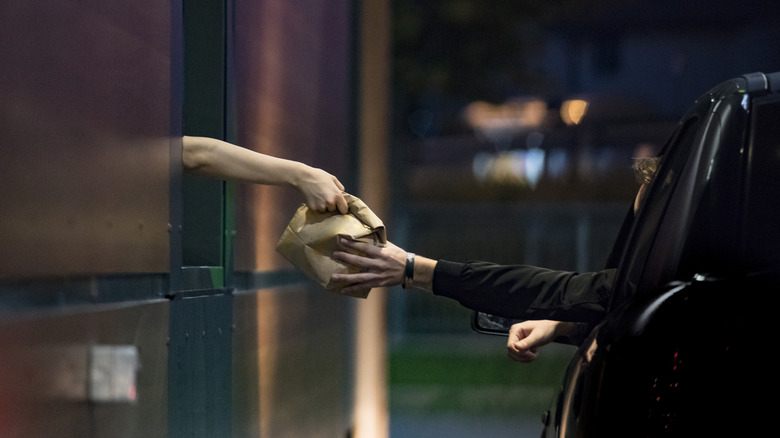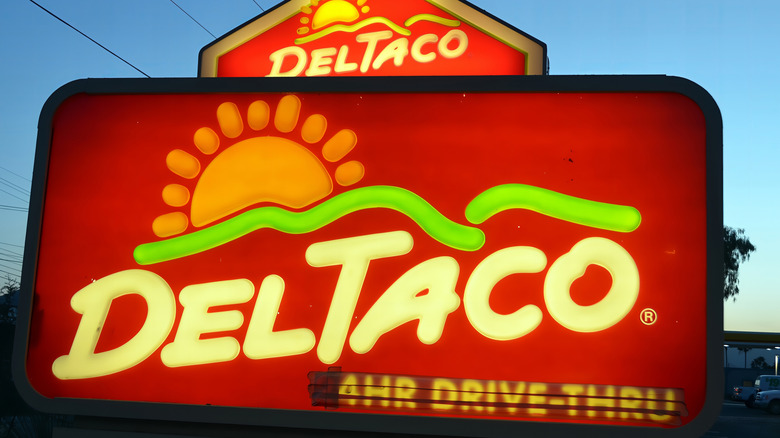Another Major Fast Food Chain Is Closing A Ton Of Restaurants
In an era absolutely haunted by big chain bankruptcies and widespread store closures, yet another household name is clearly struggling. Fast food chain Jack in the Box announced the pending closure of up to 200 stores, via a late April 2025 Form 8-K filing and press release. The news comes hot on the heels of the larger trend of restaurant chains struggling and even facing bankruptcy in 2024. Not to mention the shut-down of a healthy East Coast burger chain, ongoing Wendy's store closures, and even KFC announcing store closures in 2025.
Per details provided in the 8-K filing, Jack in the Box plans to shut 150-200 "underperforming" restaurant locations out of its current 2,200-strong fleet, and soon. The block closure plan includes shuttering 80-120 of these predetermined "underperformers" by the end of 2025, with any remaining of the decided-on 200 total stores facing closure as soon as franchise termination agreements will allow.
While the San Diego, CA-based chain has not made any announcements regarding potential bankruptcy protections, the brand's restructuring effort is not insignificant. The block closure is part of the company's "JACK on Track" plan, a multipronged effort mean to improve the long-term financial performance of the company, which, until recently, was facing rapid expansion. The 8-K also references the chain's plans to sell off Del Taco, the Mexican food focused fast food chain that Jack in the Box acquired in 2022.
An abbreviated history of Jack in the Box
Jack in the Box was founded in 1951. The chain's curious name befits its curious place in fast food, both past and present. Originally founded as Topsy's Drive-in, the chain eventually morphed into Jack In the Box. The first location opened in Long Beach, California, with a giant jester atop the building that would inspire the chain's famous head logo. The chain grew from there, emphasizing the use of its revolutionary two-way intercom drive-thru ordering system, or "box." For decades, Jack in the Box grew its business, with the bulk of its stores owned by franchisees. The brand is known for its eclectic mix of tacos, burgers, and chicken tender as well as its late-night service — with many location drive-thrus open 18 to 24 hours a day.
In 2018, a franchisee group demanded the chain's CEO, Lenny Comma, be removed from the chain's board for years of failing to correct declining sales. In 2019, Comma announced major changes including menu downsizing, as well as a potential sale of the chain entirely. Comma also left his CEO position in 2019, and was succeeded by Darin Harris in 2020. Under Harris, the chain acquired Del Taco, and quickly attempted to sell off some of Del Taco's stores while simultaneously getting aggressive about Jack in the Box franchising. Harris resigned in 2025, and was quickly succeeded by Lance Tucker in March 2025, despite Tucker initially coming into Jack in the Box as its Chief Financial Officer in January 2025.
Struggles and plans
The company's JACK on Track turnaround plan is largely focused on improving value for shareholders, rather than boosting sales to customers. In addition to store closures, the plan outlines a halt to new restaurant concept development to reduce costs, as well as the selloff of real estate in order to bulk up dividends. The company's new CEO is stressing a return to simplicity for the chain, specifically an asset-light business model, which likely means slashing infrastructure and operations rather than going back to menu basics.
Over recent years, Jack in the Box has aggressively expanded, developed, and acquired other chains to expand its footprint and shrink its assets — largely to delay the impact and costs of the chain's massive debt. The company sold fast-casual chain, Qdoba, in 2018, and leadership may be hoping to replicate the success of that sale with the potential sale of Del Taco in 2025. However, there is something grim about Jack in the Box's attempts at rapid expansion, rather than focusing on customer needs, instead biting the company in the clown hat.
Even in 2019, then-CEO Lenny Comma noted the winning fast food strategy, with Nation's Restaurant News reporting that Comma said, "When you look at who is winning, they are selling a lot of à la carte items cheaply." Unfortunately, the idea that Americans will simply buy more fast food if it is actually affordable may still be too revolutionary of an idea for a chain looking to profit off of mergers, acquisitions, and the shuffling around of debts.


